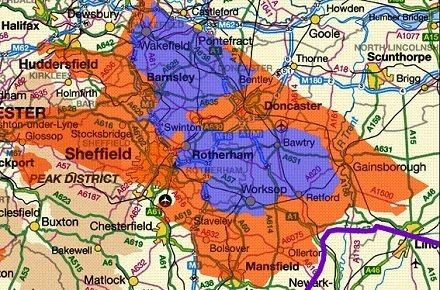Nottinghamshire's Minerals Plan is up for review. Amongst other things it includes policies for extracting hydrocarbons. In the past the county has been a major source of coal. In the future large parts of the county could be fracked for shale gas and coal bed methane.
 The government has already issued licenses allowing large parts of Nottinghamshire to be fracked. An Australian company Dart Energy has planning permission to drill exploratory wells in North Notts. A Notts-based company Alkane Energy says it wants to frack the former coalfields of South Yorkshire and Nottinghamshire.
The government has already issued licenses allowing large parts of Nottinghamshire to be fracked. An Australian company Dart Energy has planning permission to drill exploratory wells in North Notts. A Notts-based company Alkane Energy says it wants to frack the former coalfields of South Yorkshire and Nottinghamshire.
There is also a consortium seeking to frack an area from Bawtry to Gainsborough across North East Bassetlaw.
The County Council says fracking operations should be allowed "provided they do not give rise to any unacceptable impacts on the environment or residential amenity". Details at www.nottinghamshire.gov.uk/minerals.
A campaign group Frack Free Nottinghamshire was formed in November 2013 after a demo in support of 'Global Frackdown' in October (see below for photos). See report on Nottingham Live and updated info on Frack Free Notts facebook page.
Where will they frack?
In the past, oil and gas have been pumped up from underground reservoirs. That resource is running out. Now exploration has turned to gas and oil locked into deep layers of shale. That requires high pressure water to fracture the shale rock - known as hydraulic fracturing or fracking. The same process could be applied to deep coal layers which haven't previously been mined. The County Council says that all of the Eastern half of Notts could be fracked for 'coal bed methane'.
There are also two main areas of potential shale gas across the North and South of the county identified by the British Geological Survey. One area known as the Widmerpool Trough extends from Derby and Long Eaton across the River Derwent (which provides drinking water) towards Loughborough and Melton Mowbray (area coloured orange on map):
There is a more extensive area of shale under South Yorkshire across North Nottinghamshire into Lincolnshire known as the Gainsborough Trough. (The area coloured orange is a deeper layer North of Mansfield; the area coloured lilac also has a more shallow layer of shale gas North of Worksop and Retford.)
So far, Dart Energy has planning permission for exploratory boreholes at two sites near Retford to assess the potential for coal bed methane. One is 1km East of Eaton. The other is 1km North of Sutton cum Lound in Daneshill Energy Forest. The Environment Agency is considering a permit for the Daneshill borehole. Some details are on the Sutton Parish Council website.
Dart is also part of a consortium with licences to frack an area of North East Bassetlaw between Bawtry and Gainsborough. Partner companies include IGas and Egdon with past experience in conventional oil and gas in the Notts area, and a US company eCORP with shale gas experience. From 2014, French oil company Total will be investing in this area with an intention to take control when it moves from exploration to production. (Details on Frack-Off website.)
In January 2014 Prime Minister David Cameron came to the IGas oilwell at Beckingham to promote fracking. Protesters included local Bassetlaw MP John Mann.
For background information see our campaign page 'Could 'fracking' come to a gas well near Nottingham?'.
Some reasons to oppose fracking
1. The main reason is that we need to restrict fossil fuel burning to avoid uncontrollable climate change (and ocean acidification). Proven reserves of oil and gas are already more than we can afford to burn over the next few decades. So investment should go into renewable energy, not searching for more marginal fossil fuels.
2. Methane is a much more powerful global warming gas than carbon dioxide. It needs only 2-3% of methane from gas wells to leak to atmosphere for it to be worse for climate change than burning coal. Although fracking industry sources claim methane leakage is below this, independent research into fracking operations in the US suggest typical leakage rates over 5%.
3. Fracking causes earth tremors. Although these will usually be no worse than the tremors associated with coalmining in Notts, in the case of fracking it could indicate that fault lines are being lubricated - allowing leakage of fracking water and methane.
4. There have been reports in the US of emissions of carcinogenic hydrocarbons including benzene and toluene detected near fracking sites.
5. Industry sources suggest linings around drill holes have a high failure rate over the lifetime of drilling - causing further leakage of methane and other gases.
6. About 50% of fracking water is returned to the surface, containing contaminants from the shale or coal layers - including heavy metals and radioactivity - which will be discharged to water courses or require transportation to landfill. See for example a National Geographic discussion.
Photos from Global Frackdown: Nottingham


